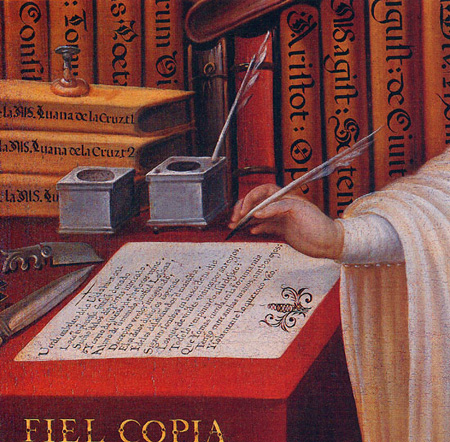LETTER |
 Letter writen to Sor Juana Ines de la Cruz
Letter writen to Sor Juana Ines de la Cruz
Sor Juana Ines de la Cruz
Hieronimite Order
Convent of St. Paula
Mexico City, Mexico
Dear Sor Juana Ines de la Cruz,
Greetings, I hope all is well in the convent. First of all, I would like to introduce myself briefly, my name is Julie Grados and I am a college student at Loyola Marymount University. I am a Chicana and I will be finishing up my degree within the next few months. My bachelor’s degree is a combination of all the subjects I like to study: Theology, Biology, and Chicano Studies. I am glad to have come along this far because I am a first generation college student that has struggled to complete my college education. Ever since I was a little girl I have always enjoyed school but as I’ve grown older there have been some rough times where I couldn’t meet all the demands of family, school, work, church, and social life. Regardless of this I’ve always kept education as one of my top priorities. Because of this I find a connection between you and me and that is the fact that education has always been our passion and one of our top priorities.
Thus, I believe I owe part of my success to you, Sor Juana Ines de la Cruz, because you are a strong woman that stood up for your right and the right of all women to be part of the realm of education. As a woman in the patriarchal society of New Spain/Mexico you were a pioneer in the academic world. Thus, your life has inspired many women like me break free from the restraints of society and to continue with their own education. I am glad that strong women like you opened the academic door to other women and lived an astonishing life for others to follow.
I initially became interested in your life and literary works because when I traveled to Mexico I heard little snippets of information about you here and there. And during these travels to Mexico I discovered that the people of Mexico truly admire you. Many speak of you as a hero and a very important figure in the history of Mexico. I even discovered you on a Mexican bill while paying for my lunch one day. You have been such an influential woman that the Mexican treasury has placed your image on the 200 pesos bill. You are the only woman whose image appears on a bill or coin in all of the United States and Mexico. Your picture has been circulating in all the 200 pesos bills since the first day it went into print in February 7, 1995. And after more than 10 years the 200 pesos Mexican banknote is still in circulation proudly displaying your image on one side and the Templo of San Jeronimo on the opposite side. Even though this accomplishment might seem minor due to the fact that money symbolizes merely the material world, I believe it goes beyond this initial presupposition. Money, whether in small or large quantities, is accessible to all people thus, making you accessible to all people. You are within the people of Mexico every single day. Many see your image day after day. And regardless of how much people know about you, they still receive a positive message by looking at the image of a woman on their bills. I am proud of you, Sor Juana Ines de la Cruz, for you are the only woman whom is esteemed enough to be made a public image. I am glad to have noticed your picture on that bill because it left me wondering about you! And the opportunity to learn more about you arose within my studies at LMU.
Thus, as soon as the opportunity arose, I decided to learn more about you. I am currently taking a Chicano/a Studies course titled Chicanas and Latinas in the US with Professor Alma Lopez. The major project for this course is to create a web page that contains the information of influential Chicanas in the realm of art, writing, and/or activism. I chose you as an influential Chicana writer because I have briefly met you when I travelled to Mexico, as I mentioned above. I also selected you because I am pursuing a major in theology with a minor in Chicano/a studies and I thought it would be beneficial to learn about you since you were in the spheres of religion and culture. Your literary works spoke to both spheres the religious and the secular.
Within my research thus far, I’ve learned quite a lot about your life events and accomplishments. I would like to share some of the similarities I found between your life and mine. The first one, of course is the fact that we’re both women whom are passionate about learning. Another is that when we don’t like the place where we are at we have the courage to change. You didn’t like being in part of the Discalced Carmelites and within three months you took the courage to change to another order where you found the freedom you desired to do the things you loved. And I did a very similar thing at LMU, when I first entered I didn’t like my major and within three months (1 semester) I also took the courage to change to a major that would give me the freedom to enjoy learning about that topic. Yet another similarity is that you and I both like to create. You like to create moving pieces of writing and I create drawings and paper crafts.
Besides our similarities I would like to share with you some of the connections between your works and the major concepts found within the works of Laura E. Perez and Gloria Anzaldua. In the work of Laura E. Perez titled, Chicana Art: The Politics of spiritual and Aesthetic Altarities, she dedicates a chapter of her book to the concept of land. Perez discusses how important it is to be arraigados, meaning rooted in place whether it be in your body, position in society, or a sense of belonging in society. I sense that you are very arraigada in what you’ve always wanted, which is your education and pursuing the art of writing powerfully moving and influential pieces of work. You have fought for your right to be part of the intellectual world where you can exercise the right to write on controversial topics such as the oppression of women (Repuesta) and men’s foolishness (Hombres Necios). Another topic that is connected to land and belonging is mestizaje. Perez describes mestizaje as, “a split sense of belonging and not.” I believe you are a mestiza for two reasons. The first reason is that you are a Spanish woman living in New Spain/Mexican land. You belong because the territory is under Spanish rule but yet the land is still indigenous. And the second reason is that you are cloistered in a convent but yet out in the secular world. Your writing transcends the confinements of those walls that keep you closed up. And yet another example of mestizaje is seen in your academic involvement because you are an educated woman in an intellectual world that is governed by men. Thus, these contradictions you are living are naturally making you a mestiza since you have a split sense of belonging. You transcend the boundaries that make you just one and you’re caught in between two realities that neither make you one nor the other but both. Thus, you’re arraigada and a mestiza all at once.
Now, I would like to share with you the work of Gloria Anzaldua titled, Borderlands. In her work Anzaldua describes the new mestiza consciousness is accomplished by going through two stages: the coatlicue state and the nepantla state. I would like to share this with you because I believe that throughout the years you have acquired the new mestiza consciousness. The coatlicue state is a time of darkness in which you go inward into the dark to come out with new light, thus, enabling you to decide what is best for you. You went through the coatlicue state at a very young age when you were 20 and you had fear of renouncing to the conventional way of a women’s life in the seventeenth century. During this time of fear and defiance you decided to object to the traditional role in marriage and fight for your right to the intellectual world. Then, you achieved the neplantla state when you immersed yourself in the academic world that was predominantly for men. These are all great achievements!
I would like to conclude by saying thank you for your time and interest in reading my letter. I hope you enjoyed reading all the information I shared with you. Have a great day and enjoy your writing!
Your friend,
Julie Grados